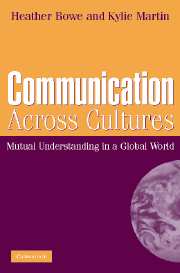Book contents
- Frontmatter
- Contents
- List of figures
- List of tables
- Transcription conventions
- Preface and acknowledgments
- Chapter 1 Culture, communication and interaction
- Chapter 2 Direct and indirect messages: The role of social context identified by Grice and Searle
- Chapter 3 Politeness and face
- Chapter 4 Speech acts and politeness across cultures
- Chapter 5 The analysis of conversation
- Chapter 6 Power relations and stereotyping
- Chapter 7 Naming and addressing: Expressing deference, respect, and solidarity
- Chapter 8 Cultural differences in writing
- Chapter 9 Interpreting and translating
- Chapter 10 Intercultural communication issues in professional and workplace contexts
- Chapter 11 Towards successful intercultural communication
- References
- Index
- References
Chapter 1 - Culture, communication and interaction
- Frontmatter
- Contents
- List of figures
- List of tables
- Transcription conventions
- Preface and acknowledgments
- Chapter 1 Culture, communication and interaction
- Chapter 2 Direct and indirect messages: The role of social context identified by Grice and Searle
- Chapter 3 Politeness and face
- Chapter 4 Speech acts and politeness across cultures
- Chapter 5 The analysis of conversation
- Chapter 6 Power relations and stereotyping
- Chapter 7 Naming and addressing: Expressing deference, respect, and solidarity
- Chapter 8 Cultural differences in writing
- Chapter 9 Interpreting and translating
- Chapter 10 Intercultural communication issues in professional and workplace contexts
- Chapter 11 Towards successful intercultural communication
- References
- Index
- References
Summary
INTRODUCTION
This book is intended as an academic reference for undergraduate and graduate students and interdisciplinary researchers who do not have specialised knowledge of linguistics. Key concepts relevant to an understanding of language issues in intercultural communication are drawn from the research areas of pragmatics, discourse analysis, politeness and intercultural communication. Relevant academic literature and recent research conducted by the authors is exemplified and explained throughout the book so that students can become familiar with the way research in this field is reported and can follow up on the ideas presented.
An understanding of intercultural communication is crucially related to an understanding of the ways in which the spoken and written word may be interpreted differentially, depending on the context. The message received is not always the one intended by the speaker or the writer. This book systematically examines sociocultural and pragmatic aspects of the language context, and discusses a wide range of factors that contribute to the interpretation of language in context. The authors argue that an understanding of how these principles interact in a given language, and in intercultural communication, is crucial to the development of mutual understanding in the global world.
Although speakers engaged in intercultural communication typically choose a single language in which to communicate, individuals typically bring their own sociocultural expectations of language to the encounter. Speakers' expectations shape the interpretation of meaning in a variety of ways.
- Type
- Chapter
- Information
- Communication Across CulturesMutual Understanding in a Global World, pp. 1 - 8Publisher: Cambridge University PressPrint publication year: 2007



